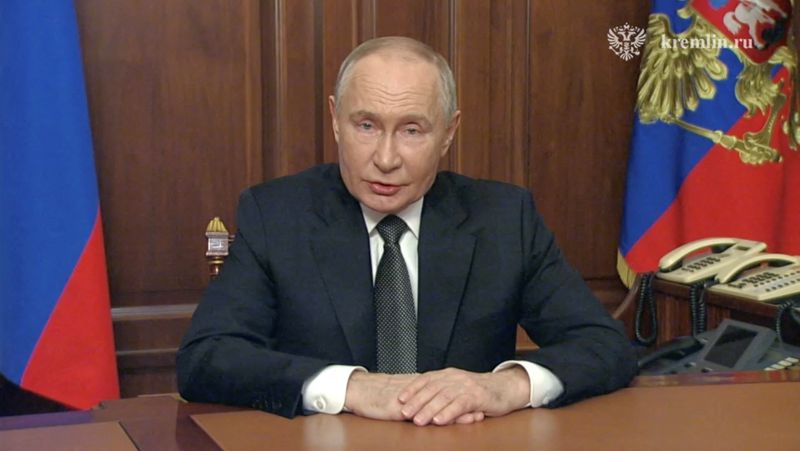In a recent address to the nation, Russian President Vladimir Putin articulated his concerns regarding the escalating Ukraine conflict, which he described as evolving into a more expansive global confrontation due to Western support for Ukraine with advanced weaponry. Following the approval from the Biden administration, Ukraine executed missile strikes on Russian targets using American-made ATACMS and British Storm Shadow missiles. These actions prompted Putin’s response, asserting that the nature of the conflict had shifted from a regional to a global scale, one that he claims had been exacerbated by Western interference. He warned that Russia would retaliate decisively should hostile actions from the West continue, stating that further military responses could disrupt the status quo and impact civilian areas.
Putin emphasized the role of the United States and Britain in this escalation, suggesting that their provision of military hardware allowed Ukraine to conduct attacks within Russian territory. While he suggested that the Ukrainian missile strikes had not resulted in significant damage, he acknowledged that the Storm Shadow attack in the Kursk region had caused casualties. The Kremlin’s perspective is that such Western-aligned attacks warrant a response against military facilities in the countries supplying those weapons. Putin framed Russia’s military actions within a context of self-defense, indicating that any doubts about Russia’s intent to retaliate would be misplaced.
In terms of military advancements, Putin revealed that Russia had successfully launched a new hypersonic medium-range ballistic missile, dubbed “Oreshnik,” targeting a missile production facility in Dnipro, Ukraine. He portrayed this development as a direct response to Western military posturing, particularly the U.S. decision to deploy medium- and shorter-range missiles in Europe and the Far East. Putin’s comments underscore his criticism of the U.S. withdrawal from the Intermediate-Range Nuclear Forces (INF) Treaty in 2019, an action he claimed was predicated on unfounded pretexts. The abandonment of this treaty, according to Putin, has heightened tensions and necessitated Russia’s advancements in missile technology.
The geopolitical implications of this conflict remain significant, with Putin alleging that Western actions are pushing the global community towards a larger conflict while warning that retaliation will be proportional. He reiterated that Russia holds the right to defend itself and to counteract military threats posed by other countries. This rhetoric aims not only to solidify domestic support but also to deter further international involvement in the Ukraine situation, framing it as a matter of national security. Putin’s assertions reflect the complexities and dangers of the ongoing crisis, emphasizing how global dynamics could be affected by actions taken on the battleground.
Putin’s remarks also included a reminder of Russia’s military presence in Ukraine, asserting control over various regions, including Crimea, and significant parts of the Donetsk, Luhansk, Zaporizhzhia, and Kherson regions. This territorial claim serves to bolster his argument regarding the necessity of defending Russian interests against external aggression. As concerns arise over potential future aggression towards NATO members, the Kremlin’s narrative focuses on portraying Russia as a nation besieged by Western encroachment, framing its military operations as a necessary precaution against the threat of Western militarism.
In summary, the exchange of advanced weaponry and military escalations between Ukraine and Russia, fueled by Western support, has led to heightened tensions and the potential for wider conflict. As both sides remain entrenched in their positions, the delicate balance of power in the region hangs precariously, with the potential for further military actions that could exacerbate global instability. Putin’s statements underscore not only Russia’s military capabilities but also reflect his strategic intent to align national sentiment against perceived external threats, while positioning Russia in a defensive posture amidst the ongoing war. The implications of this continuing conflict will likely reverberate through international relations, particularly as nations grapple with the risks associated with extended military engagement and its potential to ignite broader confrontations on the global stage.

